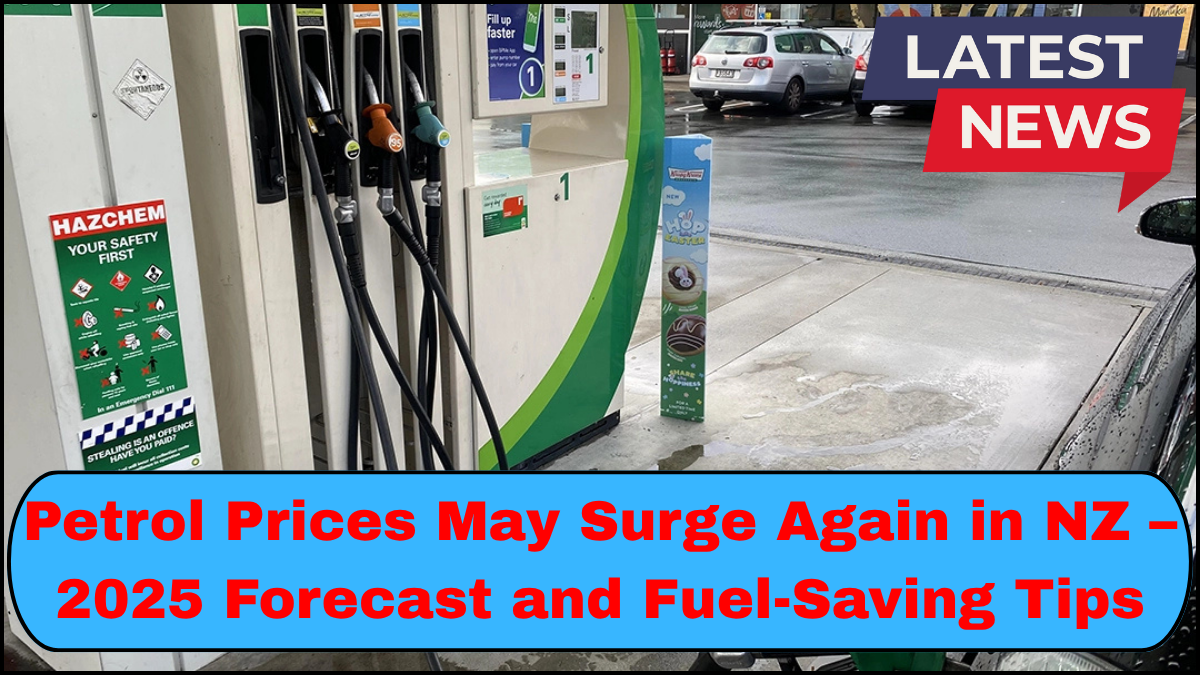As we move further into 2025, New Zealand motorists are being warned to brace for another potential spike in petrol prices. The NZ Petrol Price Forecast 2025 indicates that a combination of global market instability, rising production costs, and local regulatory changes could push fuel prices even higher than those seen in previous years.

Economic Update: Why Petrol Prices Are Expected to Rise
Several interconnected factors are putting upward pressure on petrol prices across New Zealand. Globally, oil-producing nations continue to grapple with supply chain disruptions and geopolitical tensions, especially in the Middle East and Eastern Europe. These conditions are feeding into global crude oil volatility, which is a major driver of pump prices in NZ.
On the domestic front, the New Zealand government’s Emissions Trading Scheme (ETS) and other environmental levies are expected to increase, further influencing fuel costs. According to the latest economic update, inflationary pressures are also playing a role, with the Reserve Bank’s monetary policy adjustments indirectly affecting transport expenses.
In 2024, fuel prices hovered around NZD $2.80 to $3.10 per litre. Forecasts for 2025 suggest prices could breach the $3.20 mark, especially if global oil output doesn’t stabilize.
What the NZ Petrol Price Forecast 2025 Means for Everyday Consumers
The projected price hikes are not just numbers – they translate into real costs for households and businesses alike. With higher fuel prices, everything from daily commutes to goods transportation becomes more expensive. Rural communities, which rely more heavily on private vehicles and agricultural machinery, could be hit particularly hard.
Logistics companies and courier services may pass increased fuel costs onto consumers, causing a ripple effect on the price of groceries, construction materials, and online shopping deliveries. For many families already grappling with the cost of living, this added financial strain could be significant.
Practical Fuel-Saving Tips for 2025
While we can’t control global oil prices, we can take smart steps to reduce fuel consumption and manage our transport budgets more effectively. Here are some practical strategies:
1. Maintain Your Vehicle
A well-maintained engine runs more efficiently. Regular oil changes, tire pressure checks, and air filter replacements can improve mileage by up to 10%.
2. Drive Smarter
Aggressive acceleration and hard braking burn fuel faster. Smooth, steady driving saves fuel. Use cruise control on highways to maintain a consistent speed.
3. Use Apps to Find the Best Prices
Fuel comparison apps like Gaspy can help you locate the cheapest fuel stations nearby. Over time, choosing the lower-cost station consistently can add up to big savings.
4. Reduce Vehicle Load
Extra weight in your vehicle means the engine has to work harder. Clear out unnecessary items from your boot and roof racks when not in use.
5. Carpool and Use Public Transport
Sharing rides or using buses and trains can cut your weekly fuel spend significantly, especially for daily commuters.
6. Plan Efficient Routes
Avoid peak hour traffic where possible, and use GPS to find the shortest or fastest routes. Less time idling in traffic equals lower fuel use.
Alternative Options: Electric and Hybrid Vehicles
With fuel costs on the rise, many New Zealanders are considering a shift to electric or hybrid vehicles. While the upfront cost of EVs can be higher, government incentives and lower running costs make them an increasingly attractive option. In 2025, more models are entering the market, giving buyers better variety and price ranges.
Switching to EVs not only cuts down on fuel expenses but also aligns with NZ’s commitment to reducing carbon emissions. Charging infrastructure continues to expand nationwide, making EV ownership more convenient than ever.
FAQs
Q1: Why are NZ petrol prices predicted to rise in 2025?
A: The forecast is driven by global oil market volatility, domestic regulatory changes like the ETS, and broader inflationary trends.
Q2: Will the government intervene to control fuel costs?
A: While fuel taxes and levies are periodically reviewed, substantial intervention is unlikely unless prices reach critical levels.
Q3: Are there any tax benefits for EV buyers in NZ in 2025?
A: Yes, clean car discounts and other incentives are still in place to encourage electric vehicle adoption.
Q4: How much can I save by carpooling?
A: Depending on your commute, carpooling can reduce your weekly fuel spend by 30% to 50%.
Q5: What apps can help me track local fuel prices?
A: Gaspy is one of the most popular apps in NZ for comparing real-time fuel prices.
click here to learn more